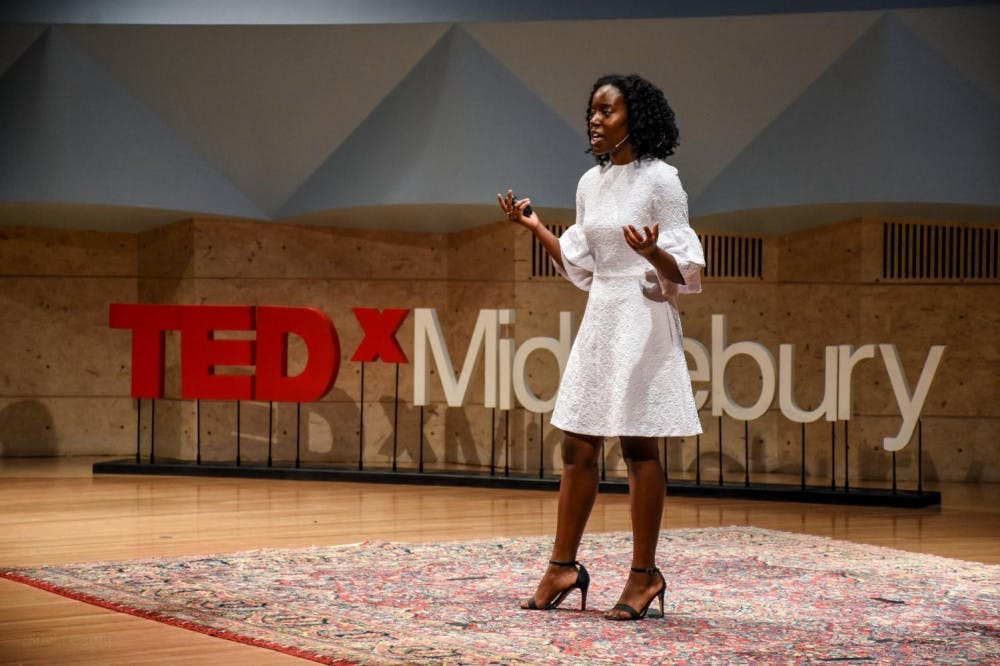What do state politics, design, racial identity, and linguistics have to tell us about self-discovery and loss? Six speakers posed—and answered—those questions and many more on Saturday at the eighth annual TEDxMiddlebury conference held in Mahaney Center for the Arts.
With nothing but a projector behind them and a rug under their feet, à la traditional TED, these speakers brought their unique and varied backgrounds to the stage to speak to this year’s theme, “Lost and Found.” The theme centered around the stories and memories that shape each person’s understanding of the world, and the reshaping of those narratives that can occur throughout one’s life.
“[It] is about the perpetual discovery and rediscovery that is essential to our existence as human beings,” the event organizers wrote. “It calls us to remember people, places, words, and histories we have left behind or taken for granted, but simultaneously invites us to reclaim, reshape, and reconstruct what we know.”
Since the conference was founded in 2010, it has been entirely run by a board of nine students. The students spend from March through November planning everything from recruiting speakers, to choosing a theme, to catering, to tech. According to the board, the conference’s success has only grown in the past few years.
“As a board member for the past three years, it amazes me to see how much our student org has grown and continues to grow. This was the first TEDxMiddlebury event to sell out and it was the first to have ASL interpretation and accessibility copies available to attendees,” said Natalie Figueroa ’18, a board member.
This year’s speakers were Daniel Erker, Lecia Brooks, Michael Jager, Attica Scott, Nia Robinson ’19, and Rana Abdelhamid ’15. Each speaker took the stage for exactly 18 minutes to share their experiences of the feeling of being lost and the beauty of finding purpose once again.
The first speaker of the morning, linguist Daniel Erker, spoke about the power of language as a way to help people find their way in life. Some see language as a barrier between different races and nationalities, but Erker sees language as a bridge to be crossed, and one that can facilitate human connection rather than inhibit it. Language can particularly offer solutions to the 30 million immigrants who live in the U.S., who are often seen as facing an inability to assimilate due to language difficulties, or, “The Hispanic Challenge.”
“What if someone told you that in our country there was a large group of people who lacked the desire to use language this way, or that there were millions of people who willfully ignored the urge to linguistically connect with their fellow Americans? You would likely and this surprising, if not simply difficult to believe. But this is precisely what some very influential and powerful individuals are asking to you believe when it comes to Americans who were born outside of the United States and then at some point later in life, moved to this country,” Erker said.
Erker used data that he and several other linguists collected from Spanish speakers in New York City and Boston to show how “The Hispanic Challenge” is not empirically supported, and immigrants are actually becoming increasingly proficient in English and using it even more than Spanish in some instances.
“The Hispanic Challenge is not real, nor is any other challenge claiming that a particular immigrant group is unwilling, unable, or unmotivated to linguistically connect to the people who live in the communities around them,” he said.
Erker finished by urging students to keep this newfound linguistic discovery close to their hearts: language is a bridge, not a barrier.
Nia Robinson ‘19, the only student speaker and the winner of the 2017 student speaker competition, gave the penultimate TED talk, reminding us “we are not as lost as we think we are.”
Robinson spoke about how being black in predominantly white spaces made her feel out of place growing up, and how she struggled to accept her own identity.
“I knew I wasn’t supposed to like myself, so I didn’t. I remember trying to pour bleach on myself to make me lighter. It didn’t work. I remember scrubbing as hard as I could because people told me I was covered in dirt. As a result, I have very soft skin, but it left me with deep invisible scars,” Robinson said.
Moving forward, Robinson told the audience, took a mix of emotional and generational memory. Emotional memory is a remembrance that triggers deeply felt emotions from the past.
“Each time someone called me the wrong name, sent me death threats, or told me I was pretty for a black girl, it was all familiar, but it would hurt more because I would remember each time it happened before,” Robinson said.
Generational memory, as Robinson defines it, is “how history affects generations…[where] we find solutions to problems that already exist somewhere.” She explained how past generations' wisdom could be applied to today, using education as an example. How can we fix the problems of poverty and segregation facing our education system, except by looking to where those problems originated?
Still, Robinson said, sometimes it seems like we can’t use memory to solve everything. However, she said: “When the two poles are pulling and my memories are at odds, I realize they both are part of me, so I can’t go wrong.”
These and the four other speakers taught the audience about lost and found through the diverse lenses of racism, creativity, politics, and more, helping to realize a wonderful event in the process.
The TEDxMiddlebury board hopes the community takes with them these lessons about what it means to be lost and found:
“[Lost and Found] makes space for both grief and joy, fate and intention, exile and belonging, context and abstraction. Most of all, it asks that we rethink our narratives of time and progress as we navigate our individual and collective past, present, and future.”
Eighth Annual TEDxMiddlebury Convenes

Comments


